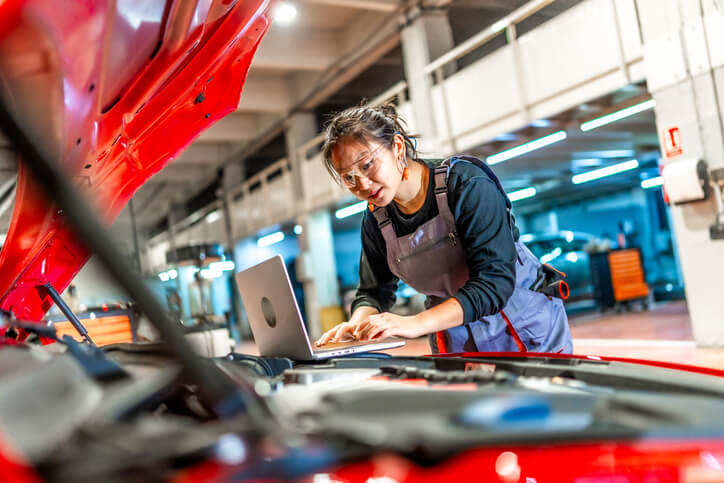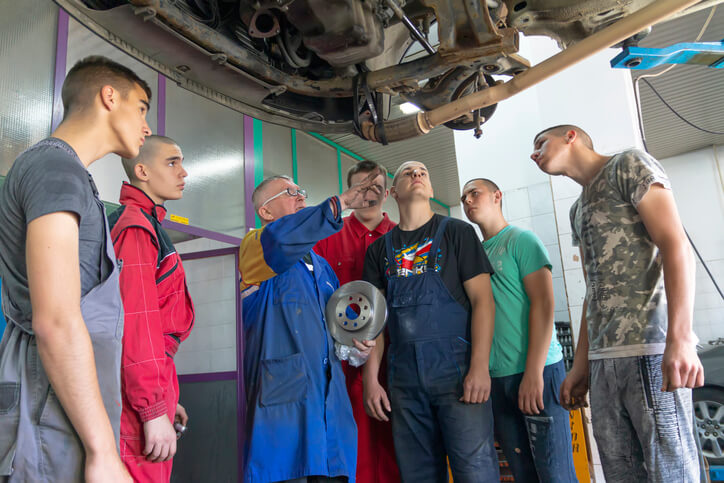Beyond Oil Changes: The Evolving Role of Auto Mechanics in the EV Era
Electric vehicles (EVs) are changing auto mechanic school and the automotive world, and with them. If you’re a car enthusiast in your 20s, you’ve probably noticed the buzz around EVs. Governments and car makers are pushing for more electric cars every year. This means the cars you’ll work on as a future mechanic will increasingly be electric.
Let’s explore how maintenance and skills are shifting in the EV era.
Why EVs Need Less Traditional Maintenance
Electric vehicles require far less maintenance than gas-powered cars because they have fewer moving parts and no internal combustion engine. Meaning no oil changes, spark plug replacements, or exhaust repairs. Their simpler drivetrains eliminate many traditional maintenance tasks, marking a major shift for mechanics accustomed to regular service needs.
In fact, electric vehicles typically require much less maintenance than conventional vehicles.
Here are a few reasons why EVs are low-maintenance:
- Fewer fluids: EVs don’t use engine oil or transmission fluid that needs regular changing. There’s no oil pan to drain and refill, so mechanics cannot change the routine oil or filter.
- Fewer moving parts: A typical gas car’s engine and drivetrain contain thousands of moving parts, but an EV has only a fraction of that number. No pistons, valves, or gears grinding away means less wear-and-tear overall.
- Less brake wear: EVs use regenerative braking, which slows the car by using the electric motor to recover energy. This means brake pads and rotors last much longer since the friction brakes aren’t used as often.
- No exhaust system: Because EVs do not burn fuel, they do not emit tailpipe emissions, so there is no muffler, catalytic converter, or exhaust pipes to fix or replace. Therefore, issues like exhaust leaks or emissions tests are a thing of the past for EVs.
In day-to-day terms, an EV owner might only come into the shop for things like tire rotations or replacing wiper blades, tasks needed by any vehicle. Fewer service visits and fewer replaced parts mean savings for drivers and different routines for automotive school graduates.

New Tasks and Skills in the EV Era
“Less maintenance” doesn’t mean no maintenance for EVs. It just means the work changes. As a mechanic, you’ll still stay busy, but instead of oil changes and exhaust repairs, you’ll focus on areas like:
- Battery care: Checking battery health and cooling systems and safely handling high-voltage components.
- Software and diagnostics: Using advanced tools to read codes, update software, and calibrate sensors.
- Electrical systems: Servicing high-voltage parts like inverters, motors, and charging ports safely and precisely.
- Thermal management: Maintaining battery cooling and electric heating systems for optimal performance.
In short, students in auto mechanic schools are becoming “auto technicians”, equally skilled with laptops and diagnostic software as wrenches.
Auto Mechanic School Blends Old and New Knowledge
Even with all the new technology in EVs, traditional auto skills still matter. Cars, electric or not, still need tire changes, brake work, suspension repairs, and body maintenance.
In fact, because EVs are heavier and deliver instant torque, tires and suspensions often wear faster. Mechanics will also service hybrid vehicles, which combine gas engines with electric systems, so understanding both is essential.
Since gas cars will remain on the road for decades, the best mechanics will master both old and new technologies. They are equally comfortable replacing a timing belt on a Civic as maintaining the battery system on a Leaf. Versatility is key.

Adapting Your Auto Career for the Future
So, what does this shift mean for aspiring mechanics? In short, opportunity. While EVs need less traditional maintenance, they create new jobs and specialties, from high-voltage system repair to charging station service. Shops and dealerships invest in training and tools, and technicians with EV expertise are in high demand, often earning higher pay for their specialized skills. As electric and hybrid vehicles become more common, mechanics who stay current will find more career options than ever.
If you’re passionate about cars, now’s the time to get hands-on training in hybrid and electric vehicle technology. You’ll learn to safely handle high-voltage systems, diagnose complex software issues, and service advanced components. All while keeping your core mechanical skills sharp. The work may look different, but the spirit of problem-solving and precision remains the same.
The bottom line is that the future of auto mechanics is electric. By combining traditional know-how with modern EV training, you’ll be ready to thrive in an evolving industry. Keeping every vehicle, from gas to battery-powered, running safely on the road.
Are you ready to explore auto careers?
Explore ATC Montreal’s program and start building the skills for the future of the automotive world.


